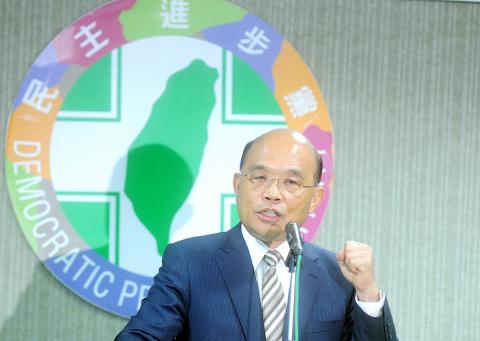The Democratic Progressive Party (DPP) is extending its first olive branch toward China with the reinstatement of its Department of China Affairs, DPP Chairman Su Tseng-chang (蘇貞昌) said yesterday.
Su also gave people a clearer idea of his initiative, “the Taiwan consensus,” which was used by former chairperson Tsai Ing-wen (蔡英文) as the main theme of her China policy during her presidential campaign.
“We have to improve mutual understanding through dialogue; to ensure democratic development peacefully and to determine Taiwan’s future with democracy. That is what I call the Taiwan Consensus,” Su told a press conference after the party’s Central Executive Committee meeting.

Photo: Wang Yi-sung, Taipei Times
A proposal to reinstate the Department of China Affairs, which was merged with the Department of International Affairs in August 2007, is the DPP’s first olive branch extended to China, Su said.
That would be followed by the establishment of a committee tentatively called the “China Affairs Committee,” which would include party heavyweights and academics and would serve as a platform to formulate the party’s China policy.
A search for a director of the department would begin immediately after the CEC meeting passed the proposal, Su said, adding that the director would then work on establishing the committee.
Regarding the DPP’s China policy, Su reiterated that the party would actively seek closer engagement with Beijing and engage in the process with enthusiasm and confidence.
However, Su said the DPP would stand firmly by its positions, values and viewpoints rather than doing anything to please China.
“The party will stay true to what it believes in, but the mentality, approach and strategy [of its engagement with China] would be adaptable and flexible,” he said.
Asked on whether he expects Beijing to echo the party’s friendly gesture, Su said “interaction and engagement would have to be mutual — as do good intentions and the extending of olive branches.”

Taiwan would welcome the return of Honduras as a diplomatic ally if its next president decides to make such a move, Minister of Foreign Affairs Lin Chia-lung (林佳龍) said yesterday. “Of course, we would welcome Honduras if they want to restore diplomatic ties with Taiwan after their elections,” Lin said at a meeting of the legislature’s Foreign Affairs and National Defense Committee, when asked to comment on statements made by two of the three Honduran presidential candidates during the presidential campaign in the Central American country. Taiwan is paying close attention to the region as a whole in the wake of a

President William Lai (賴清德) has appointed former vice president Chen Chien-jen (陳建仁) to attend the late Pope Francis’ funeral at the Vatican City on Saturday on his behalf, the Ministry of Foreign Affairs said today. The Holy See announced Francis’ funeral would take place on Saturday at 10am in St Peter’s Square. The ministry expressed condolences over Francis’ passing and said that Chen would represent Taiwan at the funeral and offer condolences in person. Taiwan and the Vatican have a long-standing and close diplomatic relationship, the ministry said. Both sides agreed to have Chen represent Taiwan at the funeral, given his Catholic identity and

Chinese Nationalist Party (KMT) Chairman Eric Chu (朱立倫), spokeswoman Yang Chih-yu (楊智伃) and Legislator Hsieh Lung-chieh (謝龍介) would be summoned by police for questioning for leading an illegal assembly on Thursday evening last week, Minister of the Interior Liu Shyh-fang (劉世芳) said today. The three KMT officials led an assembly outside the Taipei City Prosecutors’ Office, a restricted area where public assembly is not allowed, protesting the questioning of several KMT staff and searches of KMT headquarters and offices in a recall petition forgery case. Chu, Yang and Hsieh are all suspected of contravening the Assembly and Parade Act (集會遊行法) by holding

Lawmakers from the Democratic Progressive Party (DPP) yesterday established a friendship group with their counterparts in Ukraine to promote parliamentary exchanges between the two countries. A ceremony in Taipei for the Taiwan-Ukraine Parliamentary Friendship Association, initiated by DPP Legislator Chen Kuan-ting (陳冠廷), was attended by lawmakers and officials, including Deputy Minister of Foreign Affairs Francois Wu (吳志中) and European Economic and Trade Office in Taiwan Director Lutz Gullner. The increasingly dire situation in Ukraine is a global concern, and Taiwan cannot turn its back when the latter is in need of help, as the two countries share many common values and interests,